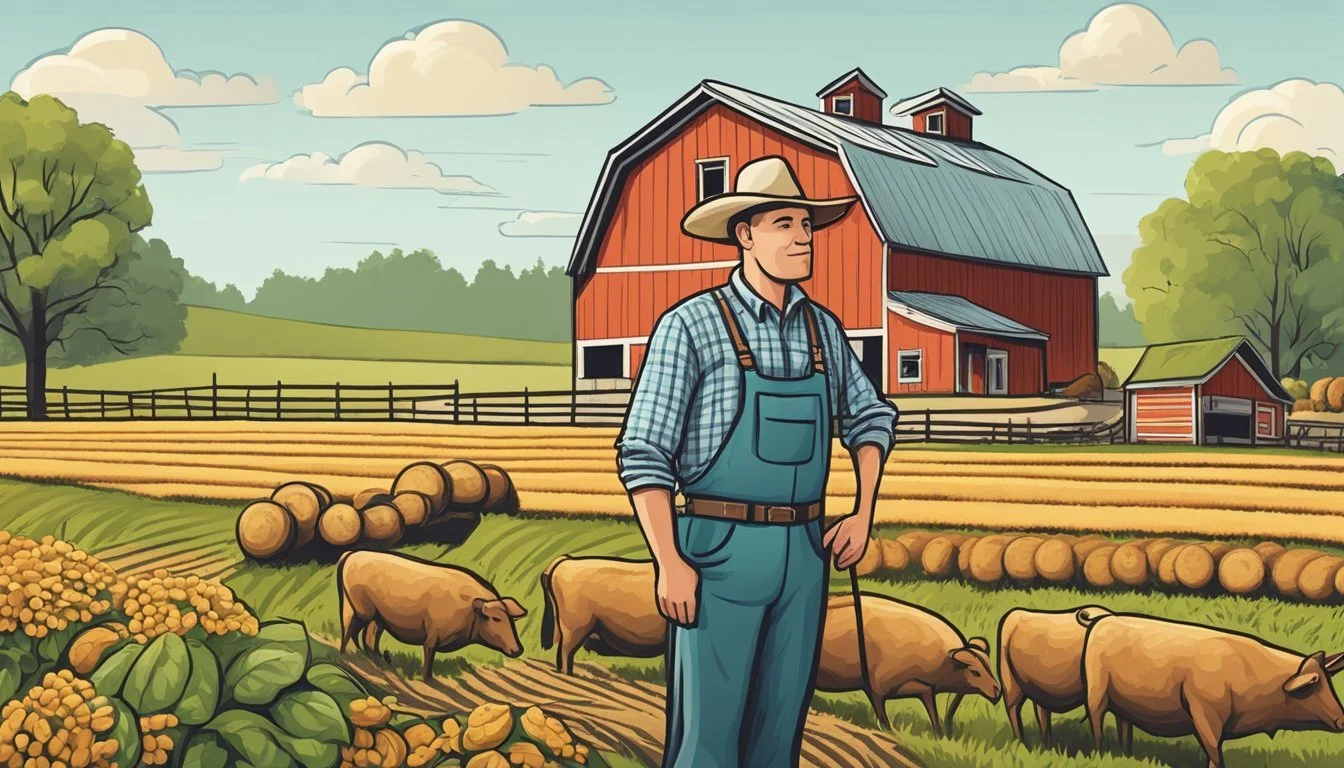Farm Loans in Minnesota
Navigating Your Financial Options for Agriculture
This Article is Part of Our Guide on Farm Loans for All 50 U.S. States
Agriculture plays a pivotal role in Minnesota's economy, with farmers being at the heart of this sector. Understanding the financial support available to them is critical, especially for those looking to start or expand their farming operations. In Minnesota, various farm loan programs are designed to assist farmers in securing the capital they need to manage their businesses effectively. These loan programs cover a range of needs, including operating costs, purchasing land, and investing in farm infrastructure.
The state offers specialized support for both seasoned and aspiring farmers. The Minnesota Department of Agriculture, for instance, administers the Beginning Farmer Loan Program aimed at encouraging new entrants into the farming industry. This initiative provides favorable financing options, manageable down payments, and additional support like business management training and financial planning, which are essential tools to help mitigate the inherent risks of farming.
Additionally, the USDA Farm Service Agency presents Direct Farm Operating Loans, Microloans, and Guaranteed Farm Loans that cater to various financial needs of Minnesota's farming community. These loans are tailored to bolster farmers' efforts to remain sustainable and competitive. With eligibility criteria designed to be inclusive, underserved, and beginning farmers can gain better access to needed funds, ensuring that Minnesota's agricultural sector continues to thrive and contribute significantly to the local and national economy.
Understanding Farm Loans in Minnesota
Farm loans in Minnesota provide crucial financial support to farmers looking to start, sustain, or expand their operations. Tailored to the needs of local agriculture, these loans offer the necessary capital for various farming-related activities.
Eligibility for Farm Loans
To qualify for a farm loan in Minnesota, applicants must meet specific eligibility requirements. Key factors include their status as a beginning farmer, financial need, and an ability to repay the loan. The Rural Finance Authority (RFA) in Minnesota considers these criteria for state programs, while the Farm Service Agency (FSA) evaluates for federal ones.
Beginning Farmer Loan Program:
Financial Need: Demonstration of financial assistance requirement.
Beginning Farmer: Defined as an individual who has not operated a farm for more than 10 years.
Ability to Repay: Proof of sufficient income potential to repay the loan.
Types of Farm Loans Available
Minnesota offers a variety of farm loans tailored to different needs in the agricultural sector, facilitated through state programs by the RFA or federal programs by the USDA.
RFA Participation Loans: For farmers seeking financial collaboration with local lenders.
Restructure II Loan: Helps farmers to reorganize farm debt for better financial stability.
USDA Farm Loans: Target underserved and beginning farmers who have difficulty getting conventional loans.
Loan Type Administered By Participation Loans RFA Restructure II Loans RFA USDA Ownership & Operating Loans Farm Service Agency
How to Apply for Farm Loans
Farmers in Minnesota can apply for loans by:
Identifying the appropriate loan program that meets their needs.
Contacting local lenders participating in RFA programs or the Farm Service Agency for federal loans.
Preparing necessary documentation, including financial records and a business plan.
Submitting a formal application as per the guidelines provided by the chosen loan program.
It is advisable to reach out to the RFA or the FSA for detailed application processes and assistance.
Financial Planning for Farmers
Effective financial planning is crucial for farmers to establish and grow their farming operations. It involves comprehensive farm business management training and thorough financial planning to accurately assess and enhance a farmer's net worth.
Farm Business Management
Farm business management is a critical component for the success of a farming venture. Prospective Minnesota farmers are encouraged to engage in Farm Business Management Programs, which offer training to improve their financial acumen and operational skills. These programs often include topics such as:
Budgeting and financial recording
Market analysis
Strategic planning
Participants learn to make informed decisions that foster profitable and sustainable farm businesses.
Financial Planning and Net Worth
Financial planning is the process where farmers analyze their current financial status and make strategies for future goals. It includes assessing assets and liabilities to determine their net worth. A farmer's net worth is a snapshot of the financial health of the farm and is calculated as:
Assets Liabilities Net Worth + Equipment - Loans = Total Assets + Livestock - Mortgages – Total Liabilities + Land - Other debts + Inventory + Savings
With proper financial planning, farmers can track their progress over time, ensure adequate cash flow, and plan for investments or retirement.
Loan Terms and Interest Rates
Loan terms and interest rates are critical for borrowers to consider when exploring farm loans in Minnesota. These factors determine the cost of borrowing and the sustainability of the loan over time.
Understanding Interest Rates
Interest rates on farm loans in Minnesota can vary depending on the program and the lender. For beginning farmers, the Minnesota Department of Agriculture's (MDA) Rural Finance Authority (RFA) offers low-interest loan programs. These programs are designed to assist with a variety of farm activities which include land purchases and farm improvements. To ensure affordability, the RFA stipulates rates that facilitate the development of agricultural resources.
For loans with terms of less than five years, the interest formula involves adding a certain percentage over the prior business day's Secured Overnight Financing Rate (SOFR). For example, if the SOFR is fixed for less than five years, the interest rate might be the SOFR plus 6.75%. It's important for borrowers to note that these rates may adjust and an additional percentage could be added if the SOFR is below a certain threshold.
Repayment Terms and Loan Guarantees
The repayment terms of farm loans can greatly influence the affordability and feasibility for a farmer's financial plan. For instance, the Beginning Farmer Loan Program from the MDA provides not only affordable financing but also features like farm business management training. These safeguards aim to reduce the financial risk to borrowers by ensuring that they have the skills necessary to manage their farms effectively, thereby enhancing their ability to repay the loan.
Many farm loans offer the option of adjustable interest rates or fixed rates for terms of five years or more. Loans with longer terms often accompany a fixed rate, giving borrowers the predictability of steady payments throughout the agreed period. Meanwhile, adjustable rates can fluctuate, potentially affecting the repayment amounts over time.
In addition, farm loans provided by entities such as the USDA's Farm Service Agency include loan guarantees. Guarantee programs safeguard lenders by promising to cover a portion of the loan should the borrower default, thus making lending to underserved and beginning farmers more appealing to financial institutions.
Purchasing Equipment and Livestock
For farmers in Minnesota, acquiring the necessary equipment and livestock is foundational for successful farming operations. They have access to tailored financial programs to support these critical purchases.
Livestock Purchases
Farmers looking to expand or diversify their livestock can utilize loan programs like the Livestock Equipment Loan Program offered by the Minnesota Department of Agriculture. These loans facilitate the purchase of various livestock, ensuring that farmers can scale their operations efficiently and sustainably. Eligible purchases under such programs may include but are not limited to:
Dairy cows
Beef cattle
Swine
Poultry
Equipment Financing
When it comes to equipment financing, the focus is not only on the direct acquisition of machinery but also on enhancing productivity in areas such as animal housing, confinement, feeding, milk production, and waste management. Farmers might consider different loan participation programs through entities like the Rural Finance Authority. Key equipment investments typically cover:
Tractors and farm vehicles
Milking machines
Feed storage and handling systems
Manure management equipment
Securing the right equipment with appropriate financial support allows farmers to maintain competitive operations and adhere to modern standards of efficiency and animal welfare.
Land Acquisition and Farm Improvement
In Minnesota, accessing capital for land acquisition and farm improvements is facilitated through various loan programs. These initiatives are designed to support the establishment and expansion of agricultural operations, ensuring farmers have the financial resources necessary for land purchases and the enhancement of their farming infrastructure.
Land Purchase Financing
Farmers in Minnesota looking to acquire land can benefit from the Rural Finance Authority's (RFA) loan programs. They offer low-interest loans for land purchases, helping to reduce the financial barrier to entry for new and existing farmers. Specifically, the RFA may participate up to 45% of the loan principal with a ceiling of $400,000, which can make a significant difference in a farmer's ability to secure new property.
Financing Farm Improvements
For those aiming to enhance their agricultural operations, the state provides support for farm improvements through several financial instruments. Farm improvements may include upgrading buildings, purchasing new equipment, or implementing innovative farming practices. Programs like the Agricultural Improvement Loan Program support these upgrades by allowing the use of loan proceeds to refinance a limited amount of existing debt with a participation term of up to 10 years. This ensures long-term investments in farm efficiency and productivity.
Financial Support and Resources
Farmers in Minnesota have access to a variety of financial support and resources tailored to their unique needs. From loans offered by local lending institutions to government-backed programs and incentives for environmentally conscious practices, these financial aids are aimed at ensuring the growth and sustainability of the state's agricultural sector.
Local Lending Institutions
Local banks and lending institutions in Minnesota are pivotal in providing financial services to farmers. These entities understand the local market and are often more flexible in terms of loan offerings and repayment terms. Farmers can benefit from tailored finance packages designed to meet specific needs such as land purchases or farm improvements.
Local Banks: Personalized lending solutions for a diverse range of farm-related activities.
Local Lender: These institutions often have a direct relationship with their clients, providing support beyond mere finance.
Government Programs
The United States Department of Agriculture (USDA) and the Farm Service Agency (FSA) offer several loan programs and support for farmers in Minnesota.
USDA Farm Service Agency: Provides guaranteed loans through local lenders, as well as direct farm operating loans with a maximum indebtedness of $300,000 and microloans up to $50,000.
Rural Finance Authority (RFA): The RFA is Minnesota's main agricultural lending arm, offering low-interest loans for various farm activities, including operating capital and debt restructure.
Tax Credits and Environmental Incentives
Tax credits and incentives are available for Minnesota farmers who engage in environmentally-friendly practices and land conservation.
Tax Credits: Available for qualifying activities that promote energy conservation and environmental sustainability on farms.
Environmental Incentives: Programs that encourage practices resulting in environmental benefits may qualify for financial support or favorable loan terms.
Special Programs for Beginning Farmers
Minnesota offers targeted support to individuals starting their journey in agriculture through a variety of programs that cater specifically to beginning farmers. These initiatives are designed to facilitate access to financing and provide guidance, lowering the barriers to entry in the farming industry.
Beginning Farmer Requirements
Eligibility for the Beginning Farmer Loan Program is defined by the Minnesota Department of Agriculture. To qualify, applicants must:
Intend to become full-time farmers.
Have limited or no farm ownership history.
Exclude established farmers looking to expand and non-farming investors.
The Farm Service Agency (FSA), a branch of the USDA, also offers assistance through loans. The USDA underscores that a beginning farmer is typically someone who:
Has operated a farm for not more than 10 years.
Meets the eligibility requirements set forth for loan programs.
Is the principal operator of the farm.
Resources and Assistance for New Farmers
Financial Assistance: Beginning farmers in Minnesota can tap into several loan programs that help with a range of farm activities. These include:
Land purchases: Financing aimed at acquiring farmland.
Equipment financing: Loans for purchasing necessary farm machinery.
Operating capital: Funds to support daily farm operations.
Educational Resources: To ensure that new farmers are equipped with the knowledge they need, the state provides:
Farm business management training: Guidance on effectively running a farm business.
Financial planning assistance: Helps minimize the risks associated with farming.
Additional Support: Farmers.gov and local farm advocates provide:
Online tools and resources: Specifically curated for beginning farmers to help locate and apply for financial help.
Direct assistance: Farm advocates can offer personalized guidance through the application process for state programs or federal assistance from the USDA.
Minnesota is committed to nurturing the next generation of farmers by offering financial help and tailored educational resources to beginning farmers, ensuring they have the tools to succeed in the industry.
Loan Application Process
When applying for farm loans in Minnesota, applicants encounter a structured process, entailing paperwork, communication with lenders, and possibly engaging with state agencies. The process is designed to help both new and experienced farmers finance various aspects of their operations, from purchasing land to buying equipment.
Documentation and Lender Communication
Applicants must compile detailed documentation for the loan application process. This includes:
Proof of Identity: Legal identification for the principal operator.
Business Plan: A comprehensive strategy for the farm business, including types of crops or dairy production.
Financial Records: Past records and projections to demonstrate financial viability and eligibility.
Communication with a local lender or a loan officer is crucial. They provide guidance on:
Required forms and documentation.
Clarification on loan terms, such as interest rates, principal, and maturity.
Options for structuring the loan to best suit the borrower's needs.
State Agency Participation
The Minnesota Department of Agriculture (MDA) offers programs like the Beginning Farmer Loan Program, assisting those entering farming. Through the MDA's Rural Finance Authority (RFA), applicants may receive:
Affordable Financing: Loans structured to promote financial accessibility.
Down Payment Aid: Options that assist with initial purchase costs.
Educational Support: Resources and training for effective farm business management.
State agency involvement often includes:
Evaluating if an applicant qualifies as a beginning or existing farmer.
Assessing the borrower's ability to match the state's financial participation.
Ensuring compliance with the state program's focus on sustainability and development.
Evaluating Financial Help
Evaluating the different financial aids available to a farmer requires understanding:
Direct Loans: Can be provided by a governmental agency directly to the borrower.
Equity Requirements: The proportion of ownership a borrower must have in their operation for eligibility.
Refinancing Potential: Options to refinance existing farm debt under more favorable terms.
The evaluation also considers whether the farmer is seeking to:
Acquire new equipment or livestock.
Expand or maintain farm infrastructure.
Purchase additional land to increase production capacity.
Through meticulous documentation, clear communication, and state agency resources, applicants are better positioned to navigate the complexities of the loan application process and obtain the financial support they need.
Managing Operating Costs
Effective management of operating costs is critical for farmers and ranchers seeking financial stability. Controlling expenditures on seeds, fertilizer, and fuel can conserve cash flow, while strategic investments in operations can foster growth.
Dealing with Fluctuating Expenses
Farmers frequently face fluctuating expenses for seeds, fertilizer, and fuel—three significant inputs that can dramatically affect their bottom line. They must navigate these variances by:
Forecasting costs: Periodic assessment of price trends for seeds and fertilizer helps anticipate and budget for expenses.
Bulk purchasing: Buying inputs like fertilizer in bulk when prices are lower can reduce costs, but requires sufficient storage and upfront capital.
Fuel efficiency: Implementing fuel-efficient practices and machinery can lead to substantial savings, given fuel's volatility.
Expanding Operations
Farmers looking to expand their operations through livestock expansion, adding poultry, or increasing crop production must analyze their operating expenses to ensure sustainable growth. Key considerations include:
Conservation: Implementing conservation practices can lead to long-term savings and potential financial assistance.
Refinancing: Refinancing existing loans can release capital for expansion at better interest rates.
Operating expenses: Detailed tracking of operating expenses pinpoints areas for efficiency gains, which is crucial for farm sustainability during expansion phases.
Conclusion
In Minnesota, various programs offer support to individuals embarking on farming ventures. Farmers in the state have access to a suite of financial aids designed to ensure a smooth transition into agricultural business. The Beginning Farmer Loan Program spearheaded by the Minnesota Department of Agriculture (MDA) significantly aids those starting out. It provides affordable financing, sensible down payments, and safeguards such as business management training.
The MDA’s Rural Finance Authority (RFA) plays a critical role as the primary agricultural lending entity. The RFA's mission encompasses the development of Minnesota's agricultural resources through low-interest loan programs. These loans support:
Land purchases
Farm improvements
Farming equipment acquisition
Operations pertaining to meat and poultry processing
Operating capital for day-to-day activities
Debt restructuring to ensure financial stability
For underserved and beginning farmers, the USDA's Farm Service Agency (FSA) offers both farm ownership and operating loans. This inclusivity reflects a commitment to promote diverse ownership in agriculture.
Local lenders in Minnesota, alongside programs like the Minnesota Beginning Farmer Program, complement federal efforts by providing tailored services to fit local needs. Financial preparation is paramount; Minnesota Extension advises prospective borrowers to approach lenders well-armed with a solid business plan and a clear understanding of the financial assistance available.
These concerted efforts create a conducive environment for farming initiatives, securing Minnesota's position as a nurturing ground for the next generation of farmers. They also contribute to the state’s agricultural legacy by ensuring it continues to thrive through fresh talents and sustained investment.











